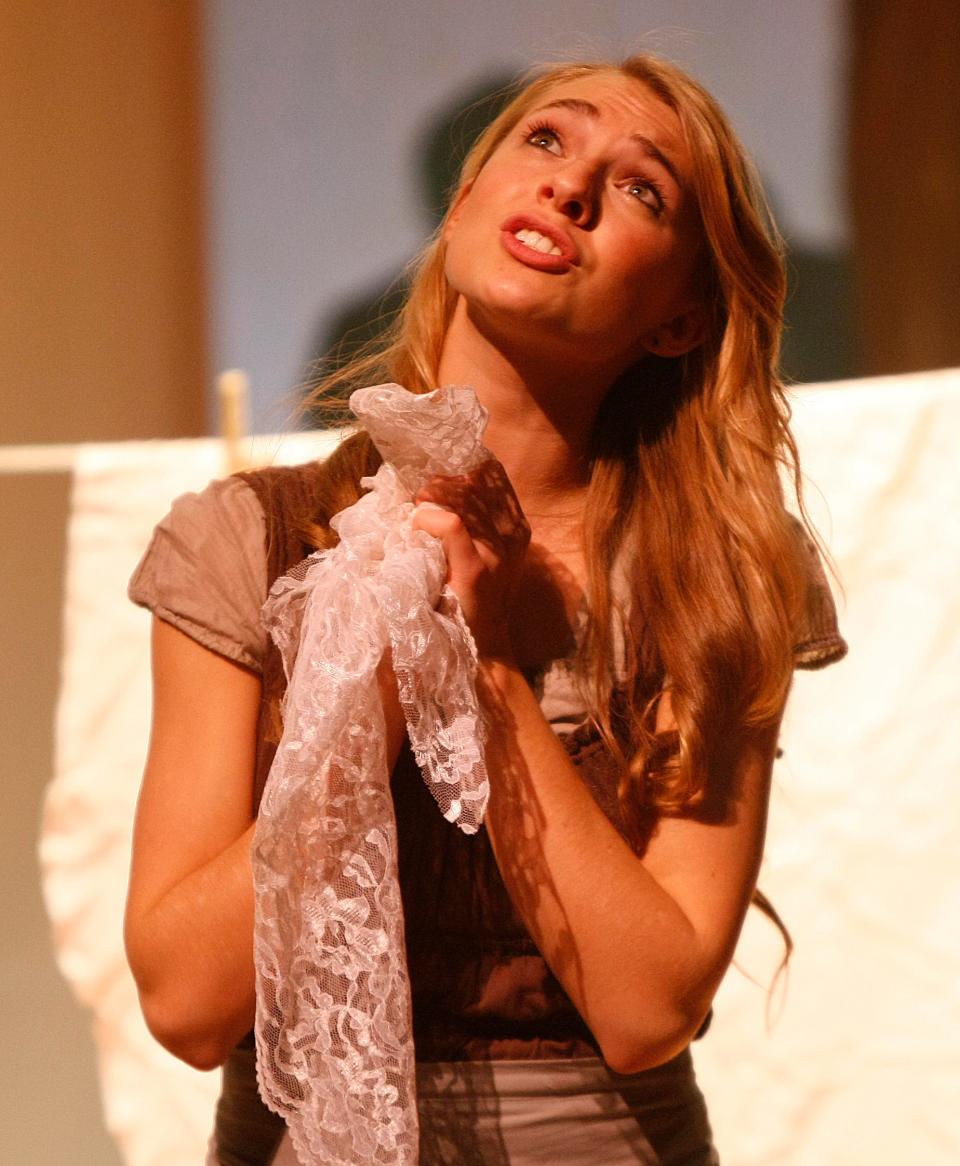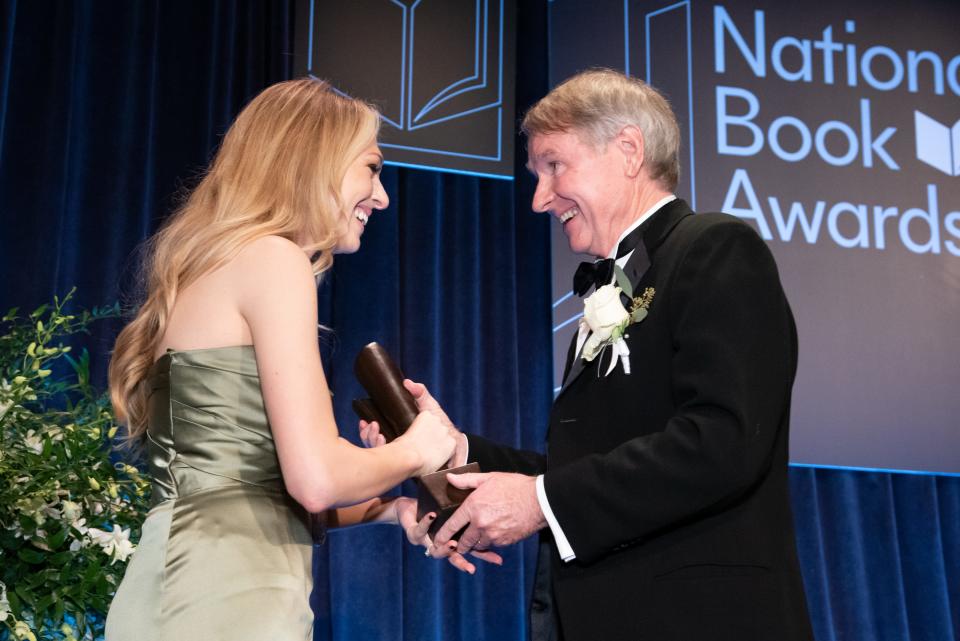South Bend inspired Tess Gunty's 'The Rabbit Hutch.' It just won the National Book Award.

Growing up in South Bend in the 1990s and 2000s, Marian High School and University of Notre Dame graduate Tess Gunty remembers different worlds coexisting in the city.
"Growing up, my mom taught at a Catholic school, so we were able to get some tuition covered, and that meant that when I was at school, my classmates tended to be from much wealthier backgrounds. Most of them lived in the suburbs," Gunty recalled. "And then, when I was in my neighborhood, all my neighborhood friends had an incredibly different hand dealt to them at birth … I think there are lots of different worlds available to people in South Bend, but there's definitely a very neglected portion of the city."
This neglected portion of the city provided much of the inspiration behind Gunty's debut novel, "The Rabbit Hutch," which received the National Book Award for fiction on Nov. 16.
More:Penguin Point closes seven locations in Northern Indiana
Awards and honors
"The Rabbit Hutch" is the first novel for Gunty, who, after graduating from Notre Dame in 2015, earned a master's of fine arts degree in creative writing from New York University. She lived in New York for four years before moving to Los Angeles, where she currently resides.
In addition to the National Book Award, since its publication on Aug. 2, 2022, "The Rabbit Hutch" has won the Waterstones debut fiction prize and the Barnes and Noble Discover Prize. On Nov. 21, it was announced that Fremantle and producer Richard Brown’s Passenger had optioned the novel for a TV adaptation, with Gunty serving as an executive producer.
She said she feels "overwhelmed with gratitude."
"There are so many people who work really hard to bring a book out into the world, people that aren't always visible in the public eye. My publishing house alone has like just dozens and dozens of people working really hard," Gunty said by phone from New York City the morning after winning the National Book Award. "Then, of course, (there are) booksellers, librarians, my agent, my family, everyone who's worked with people on judging committees. I feel more aware than ever that bookmaking is this really communal and helpful process."

A fictionalized South Bend
"The Rabbit Hutch" follows residents of the La Lapinière apartments (better known as The Rabbit Hutch), an affordable housing complex in the fictional town of Vacca Vale, Ind.
Once home to Zorn Automobiles, Vacca Vale was an industrial hub for much of the 20th century. But in the decades since Zorn's collapse, Vacca Vale has devolved into a dying Rust Belt town at the top of Newsweek's list of "America's Dying Cities" ― a list on which South Bend was second in 2011.
Despite drawing inspiration from the South Bend of her youth, Gunty said, she chose to set her novel in a fictional city so she could pull inspiration from other Midwestern cities as well.
Outdoor Adventures:Where to see the 2022 holiday light displays in the South Bend area
"I wanted to be able to pull from Gary, Ind., and Flint, Mich., and Youngstown, Ohio, and a number of other cities in the Rust Belt whose economic devastation was much worse, I think, than it was in South Bend when Studebaker closed," she said.
She said she also wanted to imagine what South Bend would have been like without Notre Dame to take on Studebaker's role as a primary employer and source of town identity and pride.
In researching for "The Rabbit Hutch," Gunty said, she spent a great deal of time studying the history of Studebaker, a history, she said, that closely inspired Zorn's. She also researched South Bend's record-breaking 2016 and 2018 floods and plagued Vacca Vale with similar, back-to-back 1000-year and 500-year floods.
Gunty said she thinks of "The Rabbit Hutch" as "an ode to places that are normally neglected in the American imagination."
"The mission of this book was to attend to neglected places and people ...," she continued. "There are millions of people in the Midwest, the post-industrial Midwest, but I think they're kind of vastly underrepresented in the American imagination. I think that places and people who have been failed by governments, by economic systems, by industries … when these kinds of things fail, preexisting vulnerabilities are made much more visible."
Representing the post-industrial Midwest
Gunty's main character, Blandine Watkins, exemplifies someone who has been failed by the system. A skinny 18-year-old with bleach-blonde hair, Blandine lives in apartment C4 of The Rabbit Hutch with three other recently-aged-out former foster youth, Malik, Jack and Todd.
Blandine "is an extremely curious and intelligent person, but she's had a lot of opportunities foreclosed to her before the book begins," Gunty said. "She now works at a diner but really aspires to be a kind of secular mystic, and I'm not even sure if she would have a good definition for what that is, but she's very obsessed with this kind of quest of divine ecstasy and 'leaving her body.'"
Viewpoint:Out of foster care − and into homelessness
In the novel's first sentence, Blandine does leave her body: "On a hot night in Apartment C4, Blandine Watkins exits her body. She is only 18 years old, but she has spent most of her life wishing for this to happen."
The rest of the novel recounts how Blandine got to this point and how the lives of her roommates, other Rabbit Hutch residents and the middle-aged son of a recently deceased former golden-age child TV star led to each of them witnessing this moment in some capacity.
These other residents ― who the novel also follows, though less so than Blandine ― include Joan, the lonely editor of an obituary website; Hope, a young mother struggling to adjust to life with a newborn; and an elderly couple, former Zorn engineer Reggie and his wife Ida.

"I was thinking about Vacca Vale as this essentially orphaned place because it has been abandoned by its main generator of protection, income and also identity," Gunty said. "So, every character in this book is orphaned in some way or another by the time we meet them. Either their parents have died or they've moved away or there's been some kind of rupture in the relationship."
Inspiration from Catholic mysticism
Gunty described Blandine as an activist. The teen protests the impending development of her beloved natural refuge, Chastity Valley, by staging an unconventional, one-woman public demonstration.
Blandine is so fiercely independent that she even renames herself following a traumatizing incident where she is taken advantage of by a male music teacher. Formerly known as Tiffany, Blandine names herself after a martyr, Gunty said, a 15-year-old Christian mystic, enslaved at the time of the Roman Empire and martyred in 177 C.E.
Blandine's namesake "was put in this arena with wild beasts … and for days and days. The legend goes that she wouldn't die," Gunty said. "They tried all these horrific methods of torture, but none of them killed her until the very end. I think (my character) Blandine is especially attached to this figure because she represents this kind of extraordinary resilience and a commitment to one's values in the face of torture and oppression, and I think she also relates to her because she's also quite young, and she has felt entrapped and oppressed by many forces in her life."
Namely News:IU South Bend professor writes about her soccer career and Title IX in 'The Keeper'
Though a high school dropout, Gunty's Blandine is an avid reader of the medieval Catholic mystics and is eager to share her interest, even with strangers at the local laundromat. Her personal hero is Hildegard von Bingen, an 1100s German mystic who, according to Gunty, in addition to her spiritual writings, wrote music, invented a language, and held "unbelievable influence" over male clergy and even kings with the help of her "ferocious intellect."
"In addition to all that, in her work, she has this kind of like tone of authority that I didn't see often in the writing of women from the time," Gunty said of von Bingen. "There's a lot of submissiveness in the tones baked into a lot of women's writing … but she has this kind of compelling confidence that I was really drawn to."
Gunty said her mother's religious devotion inspired her to feature Catholic mysticism so prominently in the novel.

"I grew up really, really Catholic, and my mom is still very, very devout. Her kind of Catholicism is really motivated by visions and miracles and signs and wonders," she said. "In her side of the family, there were a lot of stories of mystical encounters with saints or with small miracles or just kind of inexplicable phenomena."
Even now, from a more secular perspective, Gunty said, she finds mysticism "arresting and mysterious."
"I thought, 'This is such a real part of so many people's lives, this kind of religious belief, and yet it's so rarely represented in contemporary fiction ― in American fiction, at least,'" she continued.
Gunty also wanted to explore the mystics' relationship between entrapment, freedom and their bodies.
"As soon as I conceived of Blandine, the one thing I knew about her was that (the mystics were) her obsession, and she wasn't necessarily approaching it from a religious perspective. For her, this kind of quest was not motivated by a highfalutin spiritual goal, but rather, it's like an animal's response to being trapped in a cage," Gunty said. "It's this very visceral response to entrapment. She's trying to get out of her body, because she's never felt very at home or welcome in it."
Author appearances
• “From South Bend to Vacca Vale: A Conversation with Tess Gunty” at 7 p.m. Nov. 30 at Notre Dame’s Eck Center Auditorium; english.nd.edu
• “An Evening with Tess Gunty: The Rabbit Hutch” at 6 p.m. Dec. 1 at the St. Joseph County Public Library, 304 S. Main St. South Bend; 574-282-4646 or sjcpl.libnet.info
Email Tribune staff writer Claire Reid at cereid@gannett.com.
This article originally appeared on South Bend Tribune: South Bend native Tess Gunty wins National Book Award for 'Rabbit Hutch'

